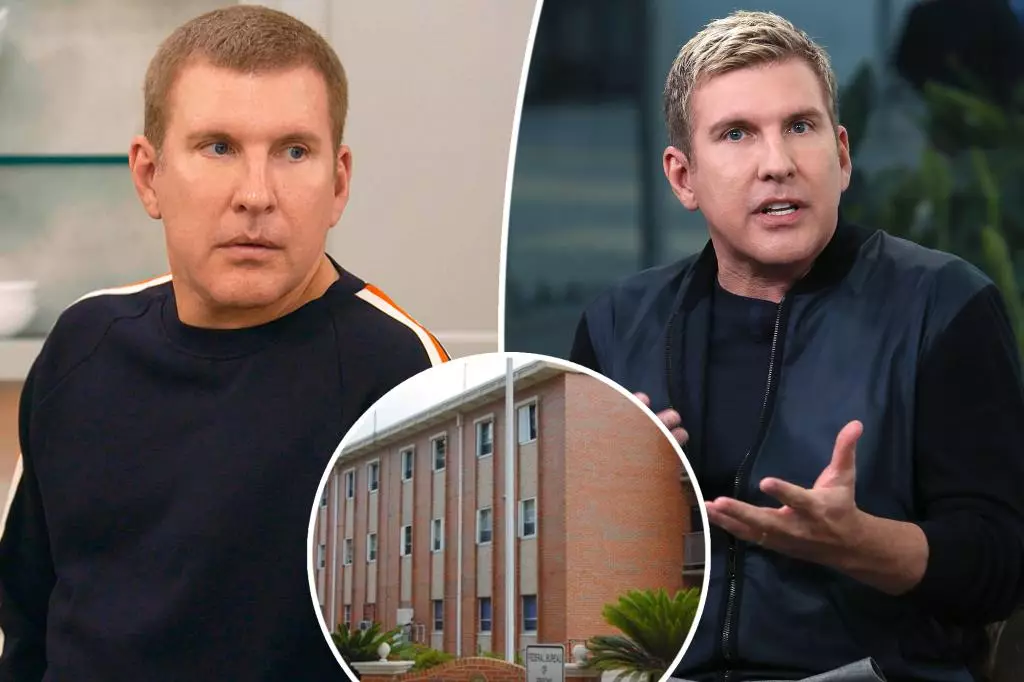The recent developments surrounding Todd Chrisley, the well-known reality television star turned convicted felon, reveal a complex portrait of life after fame. Serving a 12-year sentence for bank fraud and tax evasion, Chrisley’s journey in the Federal Prison Camp Pensacola in Florida has taken a significant turn. His recent dismissal from a voluntary position in the prison chapel raises questions about the challenges he faces in a restrictive environment and underscores the human side of incarceration.
Todd Chrisley first captured public attention through his family’s reality show “Chrisley Knows Best,” where he paraded a lavish lifestyle, presenting himself as a savvy businessman. However, the glitzy image he maintained crumbled when he and his wife, Julie, were accused of financial deceit. Prosecutors unveiled evidence suggesting that the couple submitted falsified documents to secure loans they couldn’t otherwise obtain, a breach that ultimately led to their convictions and time behind bars. This legal fallout illustrates the often precarious balance between celebrity and accountability, particularly among public figures.
Chrisley served nearly two years as an administrative assistant to the prison chaplain, a role he undertook voluntarily to contribute positively to his time served. However, the nature of his involvement has now been questioned. His attorney, Jay Surgent, indicated that Todd was dismissed without a clear rationale, apart from alleged interactions with participants of a rehabilitation program, hinting at potential restrictions faced by inmates seeking to engage meaningfully in their community. This incident raises important considerations about the conditions under which inmates can rehabilitate and contribute while incarcerated.
Surgent emphasized that the chaplain expressed satisfaction with Todd’s work, further complicating the narrative surrounding his sudden ousting. This development reveals the inconsistency between reported inmate behaviors and administrative actions within the corrective system. It forces a reevaluation of how prisons manage volunteer activities, especially those conducted by high-profile inmates.
The Impacts of Family Advocacy
Complicating matters further is the role of family, particularly that of Todd’s daughter, Savannah, who has emerged as an outspoken advocate for prison reform. Her attempts to highlight the difficulties her father faces behind bars have resulted in alleged retaliatory repercussions from prison officials. According to Savannah, Todd’s ability to communicate with his attorneys has been hindered since she began advocating publicly. This situation highlights the precarious nature of advocacy for incarcerated individuals, raising ethical questions about retaliation against those who speak up for reform and transparency.
The bond between parent and child is tested under the strain of incarceration, leading to potential pitfalls in communication and care. The revelations about Todd’s experience in prison, coupled with his daughter’s efforts, illustrate the layered challenges families face in navigating these systems.
Todd has not shied away from sharing the less glamorous aspects of his prison life. He recently described conditions that are far from ideal, citing issues such as outdated food and unsanitary conditions involving pests. Such statements pull back the curtain on the current climate of correctional facilities and highlight the often-overlooked realities of life behind bars. It emphasizes that the environment in which inmates serve their time can greatly impact their mental and physical well-being.
The notion that Todd’s experience includes encountering dead animals near food supplies is jarring and amplifies concerns about the standards of care in many prisons across the nation. These revelations demand a closer examination of federal and state correctional systems to ensure humane treatment of all inmates, regardless of their backgrounds or offenses.
As Todd Chrisley navigates his prison sentence, the narrative surrounding his life continues to evolve. The convergence of fame, family, and incarceration creates a uniquely complicated situation that speaks to larger issues within the U.S. legal system and prison reform. Ultimately, Chrisley’s story is not merely one of scandal but a reflection of the broader struggles faced by those who find themselves entangled in the judicial system, revealing the realities of how fame can complicate life’s most challenging trials.

Leave a Reply